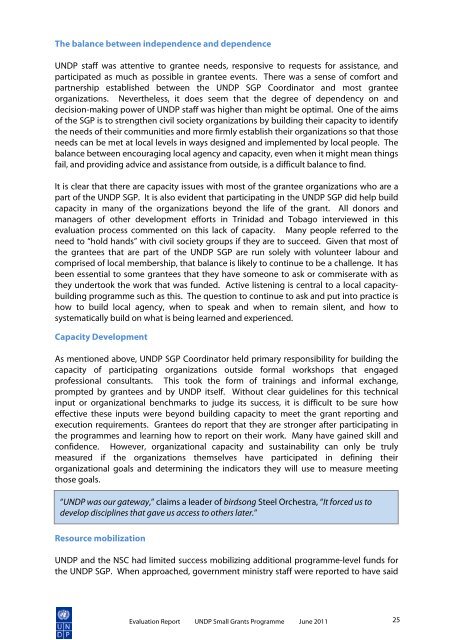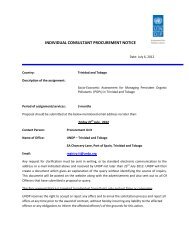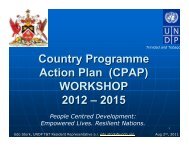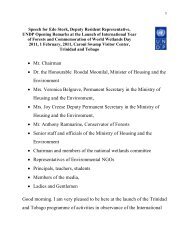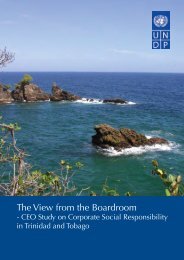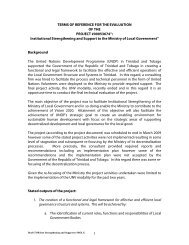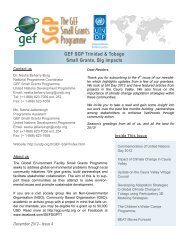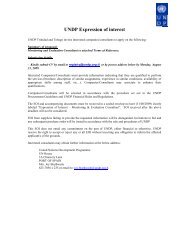The balance between independence and dependence<strong>UNDP</strong> staff was attentive to grantee needs, responsive to requests for assistance, andparticipated as much as possible in grantee events. There was a sense of comfort andpartnership established between the <strong>UNDP</strong> SGP Coordinator and most granteeorganizations. Nevertheless, it does seem that the degree of dependency on anddecision-making power of <strong>UNDP</strong> staff was higher than might be optimal. One of the aimsof the SGP is to strengthen civil society organizations by building their capacity to identifythe needs of their communities and more firmly establish their organizations so that thoseneeds can be met at local levels in ways designed and implemented by local people. Thebalance between encouraging local agency and capacity, even when it might mean thingsfail, and providing advice and assistance from outside, is a difficult balance to find.It is clear that there are capacity issues with most of the grantee organizations who are apart of the <strong>UNDP</strong> SGP. It is also evident that participating in the <strong>UNDP</strong> SGP did help buildcapacity in many of the organizations beyond the life of the grant. All donors andmanagers of other development efforts in Trinidad and Tobago interviewed in thisevaluation process commented on this lack of capacity. Many people referred to theneed to “hold hands” with civil society groups if they are to succeed. Given that most ofthe grantees that are part of the <strong>UNDP</strong> SGP are run solely with volunteer labour andcomprised of local membership, that balance is likely to continue to be a challenge. It hasbeen essential to some grantees that they have someone to ask or commiserate with asthey undertook the work that was funded. Active listening is central to a local capacitybuildingprogramme such as this. The question to continue to ask and put into practice ishow to build local agency, when to speak and when to remain silent, and how tosystematically build on what is being learned and experienced.Capacity DevelopmentAs mentioned above, <strong>UNDP</strong> SGP Coordinator held primary responsibility for building thecapacity of participating organizations outside formal workshops that engagedprofessional consultants. This took the form of trainings and informal exchange,prompted by grantees and by <strong>UNDP</strong> itself. Without clear guidelines for this technicalinput or organizational benchmarks to judge its success, it is difficult to be sure howeffective these inputs were beyond building capacity to meet the grant reporting andexecution requirements. Grantees do report that they are stronger after participating inthe programmes and learning how to report on their work. Many have gained skill andconfidence. However, organizational capacity and sustainability can only be trulymeasured if the organizations themselves have participated in defining theirorganizational goals and determining the indicators they will use to measure meetingthose goals.“<strong>UNDP</strong> was our gateway,” claims a leader of birdsong Steel Orchestra, “It forced us todevelop disciplines that gave us access to others later.”Resource mobilization<strong>UNDP</strong> and the NSC had limited success mobilizing additional programme-level funds forthe <strong>UNDP</strong> SGP. When approached, government ministry staff were reported to have said<strong>Evaluation</strong> <strong>Report</strong> <strong>UNDP</strong> <strong>Small</strong> <strong>Grants</strong> <strong>Programme</strong> <strong>June</strong> <strong>2011</strong>25
that they did not feel a need to contribute to this programme when they were managingtheir own programmes 20 . <strong>UNDP</strong> was successful, however, in bringing resources and newrelationships to grantees on an individual basis. These included introductions togovernment programmes and linking corporate donors who contributed computers andairline tickets. Many of these examples are described in the interview notes in theAppendix 2. In addition, the fact that <strong>UNDP</strong> made substantial financial investments in theform of staff salaries, staff time, and managerial costs must be noted. Over the six years ofthe programme, these costs almost match the $300,000 in grant funds contributed by JBFernandes through Rockefeller Philanthropic Advisors 21 .The match with <strong>UNDP</strong>’s Standard Operating Procedures<strong>UNDP</strong> has administered this programme within its mandated national and global financialsystems and reporting requirements. In some instances, there has been room forflexibility to take into account the particularities of grantee partners, but in general largerin-place <strong>UNDP</strong> systems of accountability have been used to manage this programme.During the life of the <strong>UNDP</strong> SGP, <strong>UNDP</strong> adjusted its methods of disbursement. During theearlier years of the programme, <strong>UNDP</strong> advanced money to grantees in a manner familiarto practices accepted by private philanthropies (and used in the GEF SGP).Disbursements were made, grantees reported quarterly on their work and expenditures,and then subsequent disbursements were released based on an agreed-upon work planand acceptance of their reports. The <strong>UNDP</strong> SGP Coordinator reports that this system wasdifficult to manage and grantees would often retain funds while they postponed activitiesand failed to report on time. There was never any suspicion or indication of misuse offunds in any aspect of this programme; nevertheless, the new system was brought in tocreate more stringent monitoring and reporting practices. This change from payments toorganizations against their budgets to reimbursements of funds already spent and directpayment to vendors was in part a reaction to the slow rate at which grantees wereaccounting for the funds they had received. The resulting adjustment to disbursementprocedures, however, acted to further encumber some grantees in their efforts tocomplete their projects. Some grantees complained that they had trouble finding themoney to spend first so they could then seek reimbursement. When the focus of the grantwas a workshop as in the case of 2010 grant to the Association of Female Executives ofTrinidad and Tobago (AFETT) who were organizing a meeting to table their report on childcare, the grantee was happy to have <strong>UNDP</strong>“This small grants programme is a wellkept secret,” said one NSC member, “andit shouldn’t be. More people should knowwhat we are doing and what the granteeshave done.”pay its vendors directly. This forgave themfrom handling grant money. In thatparticular case, this new system matchedthe work plan, but resulted in underspendingof the grant. However, mostgrantee projects in the <strong>UNDP</strong> SGP weremulti-faceted, on-going, and community-focused. Such a direct vendor pay-out systemdoes not serve to build local capacity for managing and accounting for funds or programs.Rather, it externalizes those responsibilities to <strong>UNDP</strong> staff and systems, failing to createcapacity within organizations to manage their own affairs.20Interview with <strong>UNDP</strong> SGP Coordinator Ms. Beverly Chase.21The <strong>UNDP</strong> SGP Coordinator salary devoted to the programme over 7 years totals $220,000; other <strong>UNDP</strong>contributions over that time total $69,000 (ranging from $32,170 in 2004 to $166 in 2010), for an estimated <strong>UNDP</strong>financial contribution of $289,000. After 2008 when Trinidad and Tobago became a Net Contributor Country, the<strong>UNDP</strong> SGP was no longer eligible for the same amount of core <strong>UNDP</strong> funds.<strong>Evaluation</strong> <strong>Report</strong> <strong>UNDP</strong> <strong>Small</strong> <strong>Grants</strong> <strong>Programme</strong> <strong>June</strong> <strong>2011</strong>26


